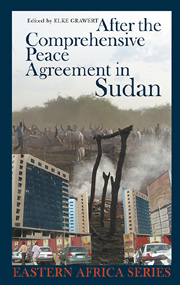Book contents
- Frontmatter
- Contents
- List of Tables & Figures
- Editor's Preface
- Notes on Contributors
- List of Acronyms
- Map of Sudan
- 1 Introduction
- I Implementation & Potential of the CPA
- II Challenges Facing Post-war Societies in Sudan
- 5 The CPA & Beyond
- 6 Ethnic Identity Politics & Boundary Making in Claiming Communal Land
- 7 Return Migration to the Nuba Mountains
- 8 Challenges of Basic Education in Southern Sudan
- 9 Abduction, Confinement & Sexual Violence against South Sudanese Women & Girls in Kakuma Refugee Camp, Kenya
- 10 Identity, Citizenship & Reintegration
- III The CPA in its Sub-regional Context
- IV Beyond the CPA
- Index
- EASTERN AFRICAN STUDIES
10 - Identity, Citizenship & Reintegration
Sudanese Returnees from Kenya
from II - Challenges Facing Post-war Societies in Sudan
Published online by Cambridge University Press: 05 April 2013
- Frontmatter
- Contents
- List of Tables & Figures
- Editor's Preface
- Notes on Contributors
- List of Acronyms
- Map of Sudan
- 1 Introduction
- I Implementation & Potential of the CPA
- II Challenges Facing Post-war Societies in Sudan
- 5 The CPA & Beyond
- 6 Ethnic Identity Politics & Boundary Making in Claiming Communal Land
- 7 Return Migration to the Nuba Mountains
- 8 Challenges of Basic Education in Southern Sudan
- 9 Abduction, Confinement & Sexual Violence against South Sudanese Women & Girls in Kakuma Refugee Camp, Kenya
- 10 Identity, Citizenship & Reintegration
- III The CPA in its Sub-regional Context
- IV Beyond the CPA
- Index
- EASTERN AFRICAN STUDIES
Summary
Introduction
Repatriation, local integration and resettlement are the three ‘durable solutions’ to the refugee problem, prioritised in that order by the UNHCR. Notably these solutions are state-centric, as they try to secure individuals civic citizenship of some kind. For southern Sudanese refugees in Kenya, repatriation intermittently began in December 2005 following the signing of the CPA. This chapter introduces the dimension of informal identity loss as a stronger factor in reintegration and shows that civic citizenship (state-ascribed identity) has a marginal impact on reintegration compared with the other forms of identity. It argues that citizenship per se cannot adequately guarantee protection of rights lost upon flight, including the right to belong, and that refugees are not in a hurry to ‘recoup’, as a previous study portends (Kibreab 2003). It illuminates aspects of ethnic, tribal, religious and gender identities as well as other forms of quasi- and micro-identities of ‘we’ and ‘they’ which people acquire and shed in the social readjustment to the realities of reintegration.
Flight is one of the prime indicators of the perceived or real abuse and /or denial of human rights, whether socio-cultural, political or economic. This phenomenon is particularly prevalent in, albeit not unique to, Africa, where an estimated 40 per cent of the population have been displaced from their homes. In 2005, Sudanese made up the bulk of refugees in the Kenyan Kakuma camp, which hosted 65,000 of them (UNHCR 2005), besides an unknown number in Nairobi and Eldoret towns.
- Type
- Chapter
- Information
- After the Comprehensive Peace Agreement in Sudan , pp. 176 - 194Publisher: Boydell & BrewerPrint publication year: 2010



